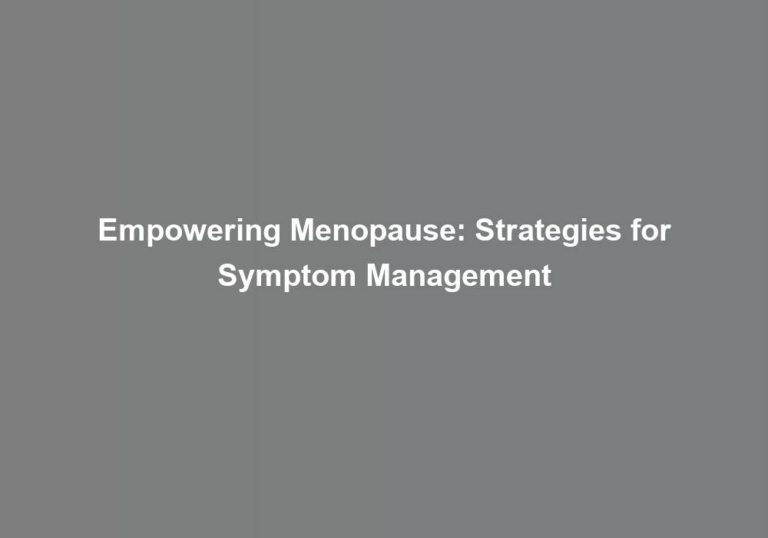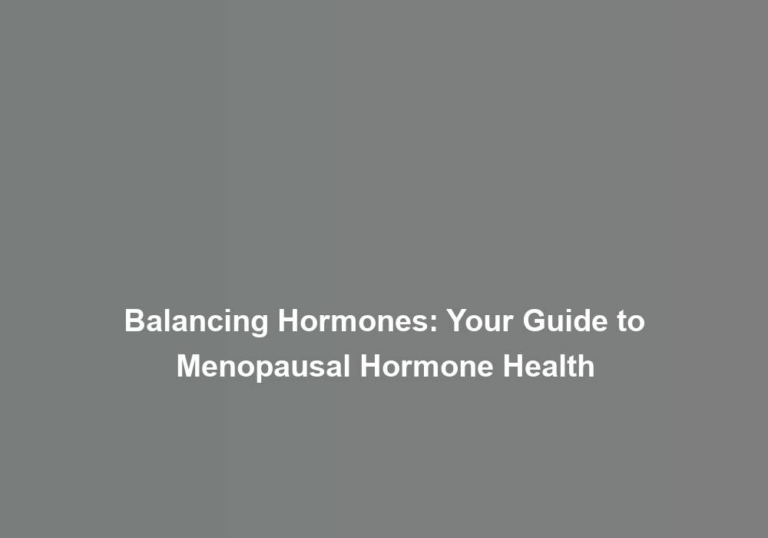Navigating Menopause: Your Guide to Hormone Health
As you approach the stage of menopause, itG??s like embarking on a new journey through uncharted territory. The changes in your body can feel overwhelming and confusing, but understanding the role of hormones during this time can bring clarity and empowerment. You may have heard a lot about the impact of hormones on your health, but thereG??s much more to explore when it comes to navigating menopause and maintaining hormone balance. Hormones play a crucial role in your overall well-being, and finding the right path to hormone health can make all the difference in how you experience this significant life transition.
Understanding Menopause Hormones
Understanding the changes in your bodyG??s hormone levels during menopause is essential for managing its symptoms and maintaining overall health. Hormone fluctuations, particularly in estrogen levels, play a significant role in the menopausal transition. Estrogen, the primary female sex hormone, is responsible for regulating the menstrual cycle and supporting reproductive health. During perimenopause, which can start several years before menopause, estrogen levels fluctuate, often leading to irregular periods and other symptoms.
As you navigate through this phase, itG??s important to comprehend how these hormonal changes can impact your body. Estrogen levels decline as menopause approaches, and this decrease can contribute to various menopausal symptoms, such as hot flashes, vaginal dryness, and mood swings. Understanding these hormonal shifts can empower you to make informed decisions about managing your health during this transition.
Research indicates that maintaining a healthy lifestyle can help mitigate the effects of hormonal changes during menopause. Regular exercise, a balanced diet, and stress-reducing activities can support hormone balance and overall well-being. Additionally, discussing hormone therapy options with your healthcare provider can provide further insight into managing estrogen levels and alleviating menopausal symptoms.
Coping With Menopausal Symptoms
Dealing with menopausal symptoms can be challenging, but there are effective ways to manage hot flashes, mood swings, and sleep disturbances. Finding the right strategies to cope with these symptoms can greatly improve your quality of life during this transition. Support and understanding from loved ones and seeking professional guidance can make a significant difference in how you navigate through this phase.
Managing Hot Flashes
Experiencing hot flashes during menopause can be disruptive, but there are effective strategies for managing this common symptom. Here are some evidence-based approaches to help you navigate through this challenging phase:
- Cooling techniques: Keep a fan nearby or wear lightweight, breathable clothing to help regulate your body temperature.
- Relaxation techniques: Practice deep breathing, meditation, or yoga to reduce stress and potentially minimize the frequency and intensity of hot flashes.
- Herbal remedies: Some women find relief with black cohosh or evening primrose oil, but itG??s important to consult with a healthcare professional before trying any herbal supplements.
- Acupuncture: This traditional Chinese practice has shown promise in alleviating hot flashes for some women.
Mood Swings Support
Coping with mood swings during menopause can be challenging, but there are effective strategies to help you navigate through this aspect of hormonal changes. Emotional regulation techniques such as deep breathing, mindfulness, and regular physical activity can help stabilize mood swings. Additionally, building strong support networks with friends, family, or a therapist can provide a sense of understanding and comfort during this transition. ItG??s important to communicate your needs to your loved ones and seek out the support you deserve. Surrounding yourself with empathetic and caring individuals can make a significant difference in managing mood swings. Remember, you are not alone in this journey, and seeking support is a proactive step in prioritizing your emotional well-being during menopause.
Sleep Disturbance Solutions
Struggling with sleep disturbances during menopause? LetG??s explore effective solutions to help you manage this challenging aspect of hormonal changes. Maintaining good sleep hygiene is crucial for managing menopausal sleep disturbances. Here are some tips to help you improve your sleep quality:
- Create a soothing bedtime routine
- Make your bedroom a comfortable sleep environment
- Limit screen time before bed
- Practice relaxation techniques such as deep breathing or meditation
Natural Approaches to Hormone Balance
To naturally balance your hormones during menopause, incorporating lifestyle changes and dietary adjustments can be beneficial in managing symptoms and supporting overall well-being. Herbal remedies such as black cohosh and red clover have been used for centuries to alleviate menopausal symptoms. These natural alternatives may help rebalance hormone levels and reduce hot flashes and night sweats. Mindfulness techniques, including yoga and meditation, can also be effective in managing stress, which can impact hormone balance during menopause.
In addition to herbal remedies and mindfulness techniques, dietary adjustments play a crucial role in hormone balance. Consuming a diet rich in fruits, vegetables, and whole grains can provide essential nutrients that support hormone production and metabolism. Omega-3 fatty acids found in fish, chia seeds, and flaxseeds can help reduce inflammation and support hormone regulation. Avoiding processed foods and excessive sugar intake is also important in maintaining hormone balance.
Moreover, engaging in regular physical activity can positively impact hormone levels. Exercise can help regulate insulin levels, reduce cortisol (the stress hormone), and support overall hormonal health. Aim for a combination of aerobic, strength, and flexibility exercises to support your well-being during menopause.
Exploring Hormone Replacement Therapy
Considering hormone replacement therapy (HRT) as a potential option for managing menopausal symptoms is a significant decision that requires careful consideration and consultation with a healthcare provider. HRT involves supplementing the body with estrogen and, in some cases, progesterone to help regulate hormone levels and alleviate menopausal symptoms. Here are some key points to consider as you explore the option of hormone replacement therapy:
-
Hormone Regulation: HRT can effectively regulate hormone levels, reducing symptoms such as hot flashes, night sweats, vaginal dryness, and mood swings. By restoring hormonal balance, HRT can provide relief from these challenging menopausal symptoms.
-
Health Risks: ItG??s essential to acknowledge the potential health risks associated with HRT. These may include an increased risk of blood clots, stroke, heart disease, and breast cancer. Your healthcare provider will assess your individual health profile to determine if the benefits of HRT outweigh the potential risks.
-
Individualized Approach: HRT should be approached with an individualized perspective. Factors such as age, overall health, personal medical history, and the severity of menopausal symptoms will influence the decision-making process.
-
Ongoing Monitoring: If you opt for HRT, regular monitoring and follow-up appointments with your healthcare provider are crucial. This ensures that the treatment remains appropriate for your needs and that any potential side effects are identified and addressed promptly.
While hormone replacement therapy can be a valuable tool for managing menopausal symptoms, itG??s important to weigh the potential benefits against the associated health risks and make an informed decision in collaboration with your healthcare provider.
Lifestyle Factors Affecting Hormone Health
Taking care of your diet and engaging in regular exercise can have a significant impact on your hormone health. By focusing on nutrient-dense foods and staying physically active, you can support your bodyG??s hormone balance during menopause. Additionally, practicing stress management techniques such as meditation or yoga can help regulate cortisol levels, which can in turn positively affect your overall hormone health.
Diet and Exercise
Maintaining a balanced diet and engaging in regular exercise are crucial factors in managing hormone health during menopause. Healthy eating and workout routines play a significant role in alleviating symptoms and promoting overall well-being. HereG??s how you can make the most of your diet and exercise routine:
- Prioritize nutrient-dense foods such as fruits, vegetables, whole grains, and lean proteins to support hormonal balance.
- Incorporate regular physical activity into your routine, aiming for at least 150 minutes of moderate-intensity exercise per week.
- Consider strength training exercises to help maintain muscle mass, which can decline during menopause.
- Stay hydrated and mindful of portion sizes to support your bodyG??s changing needs.
Stress Management
As you continue to prioritize a balanced diet and regular exercise, itG??s essential to recognize the impact of stress on hormone health during menopause. Managing stress is crucial for maintaining overall well-being during this phase. Incorporating relaxation techniques into your daily routine can greatly help in managing stress levels and supporting hormone balance. By nurturing the mind-body connection, you can alleviate the effects of stress on your hormones. Engaging in activities such as yoga, meditation, and deep breathing exercises can effectively reduce stress and promote hormone equilibrium. HereG??s a table to help you explore different relaxation techniques and their benefits:
| Relaxation Techniques | Benefits |
|---|---|
| Yoga | Reduces stress and anxiety |
| Meditation | Promotes emotional balance |
| Deep Breathing | Calms the nervous system |
Seeking Professional Hormone Health Support
When it comes to addressing your hormone health during menopause, seeking professional support can provide you with personalized guidance and effective management strategies. Hormone therapy and menopause support are crucial aspects of this journey, and having the right professionals by your side can make a world of difference. Here are some reasons why seeking professional hormone health support is essential:
-
Personalized Treatment Plans: Professional healthcare providers can assess your unique hormonal needs and create personalized hormone therapy plans tailored to your specific symptoms and health history.
-
Expert Guidance: Navigating the complexities of hormone health during menopause can be overwhelming. Professional support offers you access to expert guidance, ensuring that you are well-informed about the potential benefits and risks of hormone therapy.
-
Comprehensive Monitoring: With professional support, you can have regular monitoring of your hormone levels and overall health, ensuring that any necessary adjustments to your treatment plan can be made in a timely manner.
-
Emotional Support: Menopause can bring about emotional and psychological changes. Seeking professional support provides you with a compassionate and understanding resource to address any concerns and challenges you may face during this transition.
Conclusion
As you navigate through menopause, remember that hormone health is crucial for your overall well-being. Are you ready to take charge of your hormone health and embrace this new phase of life with confidence? By understanding your options, seeking support, and making informed choices, you can find balance and relief from menopausal symptoms. With the right approach, you can thrive during this transition and enjoy a vibrant and healthy life.







